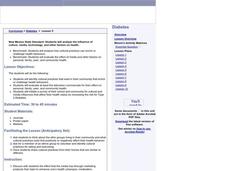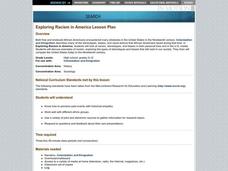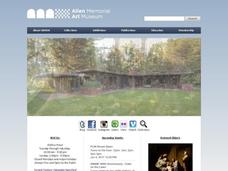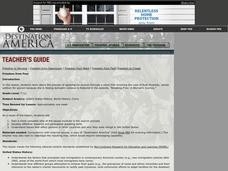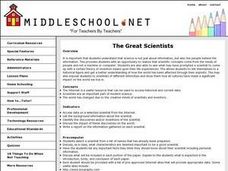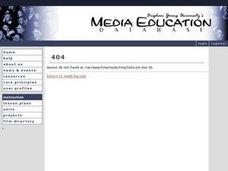Curated OER
Storytelling With Artists
Students retell a legend orally, illustrating it with the art style of the source culture.
Curated OER
Is There Seaweed/Algae in Your Food?
Students discover that seaweed/algae is a small part of the resources the oceans provide. By investigating common household products, students discover that human senses are not enough to detect the presence of seaweed/algae in food.
Curated OER
Turn-of-the-Century Child
Students are put in the role of historians and develop strategies for applying methods in historical inquiry:
Curated OER
Diabetes
Students identify community cultural practices that enrich or challenge health behaviors. Students evaluate television commercials for their effects on health and initiate a survey of cultural and media influences that might affect health.
Curated OER
One Survivor Remembers: Twenty Pounds
Learners gain an understanding of the plight of the Jews during the Holocaust. They explain the dangers of hate and extremism.
Curated OER
Antisemitism
Eighth graders explore antisemitism and propaganda and stereotypes. They make connections to current-day antisemitism, racism, prejudice and bigotry.
Curated OER
Civil Rights and the ADA
Students examine and discuss the 14th and 15th amentments, and evaluate the agendas of Americans from underrepresented groups in the quest for civil rights. They conduct Internet research and create essays or posters regarding Civil Rights.
Curated OER
Talk Back
Young scholars study print and TV ads and search for examples in which advertising companies rely on negative stereotypes or misleading information to market their products.
Curated OER
Trail of Discovery
Students collaborate on a research-based documentation of their town's founding, written from the point of view of a fictional person who lived there long ago
Curated OER
California's First Constitution
High schoolers read excerpts from speeches made at the California Constitutional Convention. They predict what the state constitution say about slavery and other issues concerning race.
Curated OER
Exploring Racism in America
Students compare racism today to racism that existed during the nineteenth century. As a field research project, students individually keep track of examples of racism, biases, and stereotypes illustrated throughout the US media over a...
Curated OER
Chinese New Year: Paper Lanterns
First graders study the celebrations of Chinese New Year. They practice measuring and cutting to make paper lanterns.
Curated OER
Freedom to Worship
Learners investigate reasons why people sought freedom to worship in the United States and some of the difficulties and issues facing them in their immigration. As immigrants, they write letters to family members in the old country.
Curated OER
Friends
Eighth graders write descriptively by using various adjectives in describing a friend to an English speaking pen-pal.
Curated OER
A Woman's Place in the House of Commons
Students become familiar with the role women play in the Canadian government. They gather, organize and analyze data on female politicians.
Curated OER
You Be the Member
Students explain the process of how a bill becomes a law. They see the role and responsibilities of a member of Parliament and explain the influence of others on the MP's decision-making.
Curated OER
India and Pakistan: a Simulation of Outcomes
Students become aware of world conflicts and how conflict resolution is used to minimize threats around the world. They analyze a current world conflict and utilize conflict resolution strategies to determine a viable peace initiative.
Curated OER
The Great Scientists
Students discuss the characteristics of competent scientists. By researching selected scientists on the Internet, they gather and organize collected information into a cohesive paper.
Curated OER
Cultural Representation in "Spellbound" Part 1
High schoolers watch the film "Spellbound". They analyze concepts of how the media represents race. They discuss how the movie depicts race after the film.
Curated OER
"Small Boy and Girl With Jumper," by Akio Takamori
Students examine and analyze the sculpture, "Small Boy and Girl With Jumper," by Akio Takamori. They answer discussion questions, discuss how immigrants make a contribution to their new country, and design and create clay symbols.
Curated OER
Two Ways of Life
Learners visit Internet sites to compare ways of life of Indians on western Texas frontier and U.S. military men at Texas forts, and draw pictures to illustrate clothing, transportation, weapons, and shelter of both Indians and U.S....
Curated OER
The Clothing of the Buddha
Young scholars discuss the idea of cultural diffusion by examining how the sculptural portrayal of the Buddha's clothing evolved in Japanese and Chinese art. This lesson concludes with a group project and presentation.
Curated OER
Role of "Outsiders" And Traders in Society
Students examine the Chinese and Japanese conceptions of "insiders" and "outsiders" and how this affects the attitude toward foreign traders from the 6th to the 16th centuries. Lesson extensions are included.
Curated OER
The Medium And The Message
Students compare and contrast Buddhist sculpture in varying materials through in-class discussions and small cooperative learning groups. This lesson includes possible lesson extensions.





